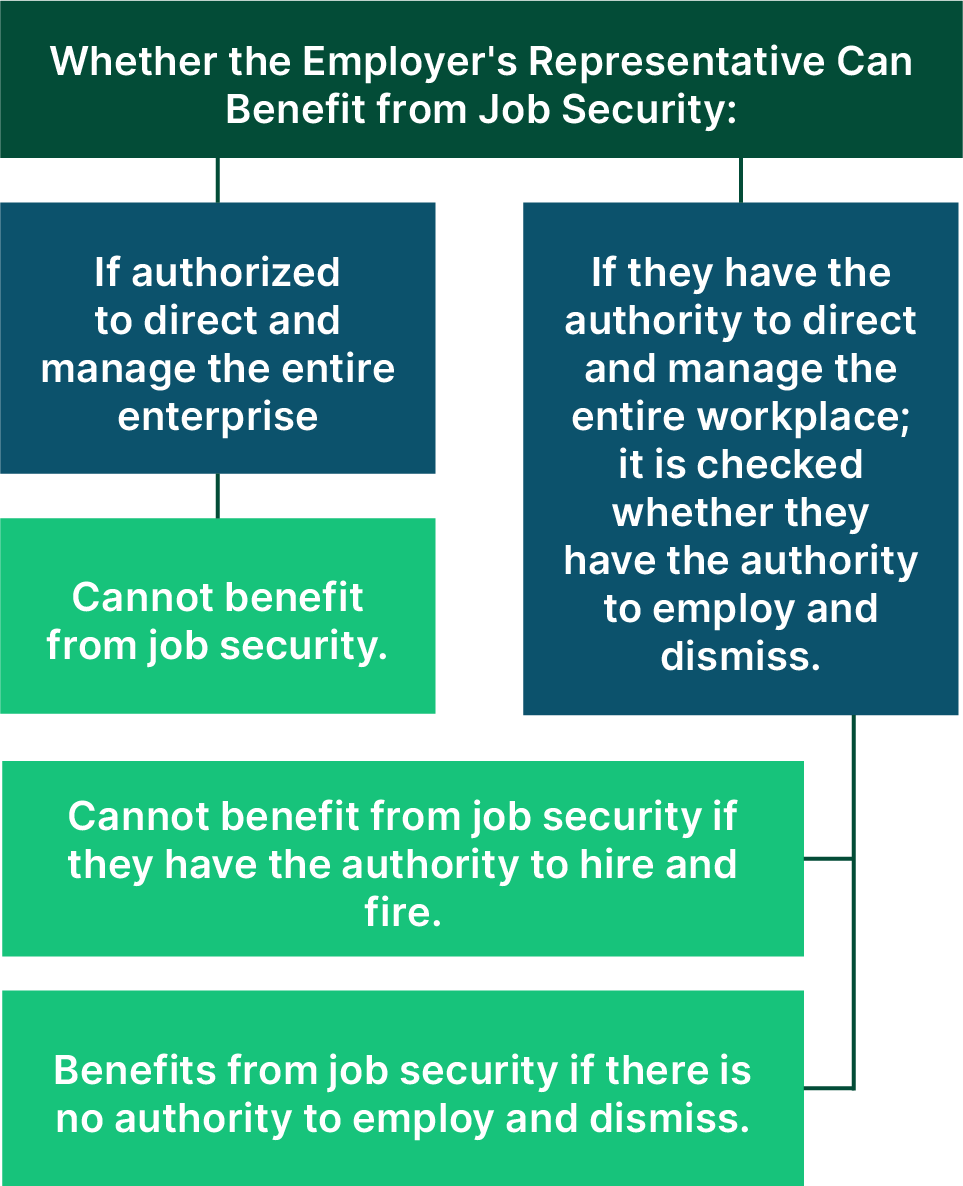Employer’s Representative and Job Security: An Evaluation in the Light of Decisions of the Court of Cassation
Introduction
The concept of employer’s representative in labour law defines the persons to whom the employer delegates the management and administration authority of the workplace and the enterprise to a certain extent. Although their employment under these names does not directly result in the employment of an employer’s representative, it is observed that employer’s representatives are generally employed under the names of CEO, CFO, general manager, deputy manager. Whether the employer’s representatives can benefit from the job security provisions, one of the instruments limiting the employer’s power to terminate the employment contract, is analyzed according to specific criteria. According to the decisions of the Court of Cassation, the terms “enterprise” and “workplace” and the powers of employer’s representative and termination are analyzed and it is decided whether an employer’s representative can benefit from job security accordingly. In this regard, this article analyses the decisions of the Court of Cassation on the conditions under which employer’s representatives may or may not benefit from the job security provisions.
Employer’s Representative and Job Security
Under Article 2 of the Labor Law No. 4857 (“Labor Law”), any person who acts on behalf of the employer and exercises authority in the management of the workplace and the enterprise is deemed to be the employer’s representative. Articles 18 to 21 of the Labour Law regulate job security provisions. In its simplest form, job security is one of the instruments that limit the authority of the employer to terminate employment contracts. In this context, job security requires terminations based on a valid reason. To benefit from job security as an employee, the employee must have worked in the same workplace for at least 6 months and at least 30 employees must be working in the workplace. In addition, the fact that the employee is working under an indefinite-term employment contract is also considered as another prerequisite. As per the last paragraph of Article 18 of the Labour Law, (i) employer’s representatives and assistants who manage and direct the entire enterprise and (ii) employer’s representatives who manage and direct the entire workplace and in addition to this, have the authority to employ and dismiss employees are excluded from the scope of the job security. In the decisions of the Court of Cassation rendered within this scope, it is seen that the concepts of enterprise and workplace are distinguished in accordance with the law, and decisions are made by evaluating the authority to employ and dismiss employees within the scope of the workplace.
Employer’s Representative and Job Security in the Light of Court of Cassation Decisions
Employer’s Representatives Managing and Directing the Whole “Enterprise”
In the doctrine, it is stated that if the employer’s representatives are authorized to direct and manage the whole “enterprise”, they will be deemed as the employer’s representative without any other condition and they will not be able to benefit from job security[1]. The Court of Cassation decisions, in parallel, address the criterion of managing and administering the entire enterprise to be considered as the employer’s representative and reach a decision accordingly:
“...the use of the title of general manager or deputy general manager in the workplace does not by itself result in being outside the scope of job security. What is important is whether the employee is authorized to represent and manage the entire enterprise; in this respect, the job description and position should be considered…” [2]
“Employer’s representatives who manage and administer the entire enterprise are considered as employer’s representatives without any other condition ... considering that the claimant is in the position of deputy general manager, has representation authority in this direction, acts as deputy general manager in the absence of the representative of the general manager, has first-degree signature authority and the claimant, who is understood to be the employer’s representative assistant who has the authority to manage and administer the entire enterprise, cannot benefit from the provisions of job security…” [3]
“...In the case at hand, it is clear that the claimant, who is the ‘assistant general manager’ in the position of the assistant of the employer’s representative who manages and directs the whole enterprise, cannot benefit from the provisions of job security by Article 18 of the Labour Law No. 4857…” [4]
“From the information and documents in the file content and especially from the job description, it is understood that the claimant is authorized to direct and manage the whole of the defendant company and uses his authority when the general manager is not present. In this case, it is erroneous to accept the case, while the lawsuit should be rejected since the claimant cannot benefit from the provisions of job security…” [5]
These decisions state that the employer’s representatives cannot benefit from the job security provisions in cases where they manage and administer the entire enterprise. As a result, it is beneficial to determine the framework of the concept of “enterprise” correctly and to carefully consider the criterion of “directing and managing the entire enterprise” in the termination of the employment contracts of the employer’s representatives for valid reasons. Additionally, since the definition of duties under employment contracts is taken into account in the determination of the employer’s representative, the correct determination of the contents of the contract constitutes another important point to be taken into consideration.
Employer’s Representatives Managing and Directing the Whole “Workplace”
According to the doctrine, in accordance with the law, the employer’s representatives who are authorized in terms of “workplace” are evaluated in terms of their employing and dismissing powers[6]. In this respect, in the decisions of the Court of Cassation in terms of authorized employer representatives at the workplace level rather than at the enterprise level, it is examined whether the employer representative has the authority to employ and dismiss:
“...it has been claimed that the claimant is the employer’s representative who has the authority to employ and dismiss employees, who manages and directs the entire workplace. There is no dispute that the claimant worked as ... Department Manager at the defendant company’s workplace. Accordingly, the claimant is not the employer’s representative or assistant who directs and manages the entire enterprise. When considered at the workplace level; although it is understood that the claimant expressed his opinion regarding the recruitment of several workers, it is understood that he does not have the authority to employ workers on his own, and no sufficient and convincing evidence has been presented regarding the dismissal of employees. Accordingly, the claimant does not have the authority to employ and dismiss workers on his own. According to the available evidence, it should be accepted that the claimant should be considered to be included in the scope of job security since he is not the employer’s representative.…” [7]
“...In the case at hand, although the claimant managed and directed the entire workplace, it is understood that he did not have the authority to employ and dismiss workers according to the contents of the file. The recruitment forms in the file contain the signatures of the Coordinator and the General Manager in addition to the claimant. In addition, the claimant’s approval of the resignation petitions does not indicate that he has the authority to dismiss employees. Because the statement of termination is a unilateral declaration of will and does not depend on the acceptance of the other party. If the claimant does not give consent, the termination declaration will still have its provisions and consequences. In this case, since it cannot be said that the claimant has the authority to employ and dismiss employees, it is not correct to accept that the claimant is the employer’s representative…” [8]
“The authority to direct and manage the entire workplace and the authority to hire and dismiss employees are sought together, in multiples. Therefore, a bank branch manager or a factory manager is not considered an employer’s representative within the meaning of Article 18 of the Labour Law, unless they have the authority to hire and dismiss employees of their own free will, although they manage and direct the workplace. They benefit from job security. Likewise, the human resources manager and personnel manager, who have the authority to hire and fire employees, will be able to benefit from the provisions of job security since they do not manage the entire workplace.” [9]
An analysis of the decisions reveals that, in accordance with the provisions of the law, employers’ representatives, who are authorized in terms of the workplace, can benefit from job security when they do not have the authority to employ and dismiss. Additionally, expressing an opinion on the recruitment of an employee or approving resignation petitions are not considered sufficient conditions for the person to be considered as the employer’s representative. In terms of employing and dismissing employees, the existence of a formal authorization is not deemed sufficient, and the criterion of being in a “decision-making” position is considered. In conclusion, it is understood that the correct determination of the scope of the concept of “workplace” and the powers of employing and dismissing based on the concrete case plays a decisive role in reaching a decision regarding the employer's representatives authorized in the management and administration of the workplace to benefit from job security.
Conclusion
Whether or not the persons who have the status of employer’s representative can benefit from job security is evaluated depending on their powers and duties. First of all, if employers’ representatives are authorized to manage and direct the “enterprise” as a whole, they cannot benefit from job security provisions. On the other hand, if they are authorized for the management and administration at the level of the “workplace”, different conclusions are reached according to their authority to “employ and dismiss employees”:

As a result, the provisions of the Labour Law and the decisions of the Court of Cassation proceed in parallel and it is understood that in disputes regarding the dismissal of the employer’s representative, it will play a decisive role in determining whether the basic conditions of job security are met, which powers are granted to the employer’s representative under the employment contract, the scope of the concepts of “enterprise” and “workplace” and which powers are exercised by the employer’s representative based on the concrete case.
- Kılıçoğlu, Mustafa / Şenocak, Kemal: İş Kanunu Şerhi, Volume 1, Legal Yayıncılık, İstanbul, 2008, pp. 436-437; Süzek, Sarper: İş Hukuku, Beta Yayıncılık, İstanbul, 2019, pp. 549-550; Kara, Ethem: İş Sözleşmesi İşveren Tarafından Geçerli Nedenle Feshi ve Sonuçları, Bilge Yayınları, Ankara, 2008, p 52.
- Court of Cassation 22nd Civil Chamber, decision dated 17.03.2015 and numbered 2015/6909 E., 2015/10511 K. (Lexpera, Access Date: 30.08.2024)
- Court of Cassation 22nd Civil Chamber, decision dated 17.03.2015 and numbered 2015/6909 E., 2015/10511 K. (Lexpera, Access Date: 30.08.2024)
- Court of Cassation, 9th Civil Chamber, decision dated 27.11.2019 and numbered 2019/3434 E., 2019/21097 K. (Lexpera, Access Date: 30.08.2024)
- Court of Cassation, 9th Civil Chamber, decision dated 22.10.2015 and numbered 2015/27863 E., 2015/29749 K. (Lexpera, Access Date: 30.08.2024)
- Kılıçoğlu / Şenocak, ibid, pp. 436-437; Süzek, ibid, pp. 549-550; Kara, ibid, pp. 52-53.
- Court of Cassation, 9th Civil Chamber, decision dated 05.05.2008 and numbered 2007/35813 E., 2008/11429 K. (Lexpera, Access Date: 30.08.2024)
- Court of Cassation, 9th Civil Chamber, decision dated 27.02.2006 and numbered 2006/1704 E., 2006/4748 K. (Lexpera, Access Date: 30.08.2024)
- Court of Cassation 22nd Civil Chamber, decision dated 13.09.2018 and numbered 2018/11146 E., 2018/18819 K. (Lexpera, Access Date: 30.08.2024)
All rights of this article are reserved. This article may not be used, reproduced, copied, published, distributed, or otherwise disseminated without quotation or Erdem & Erdem Law Firm's written consent. Any content created without citing the resource or Erdem & Erdem Law Firm’s written consent is regularly tracked, and legal action will be taken in case of violation.









